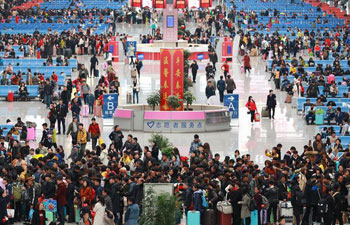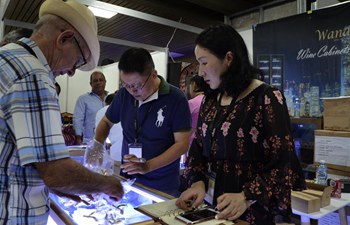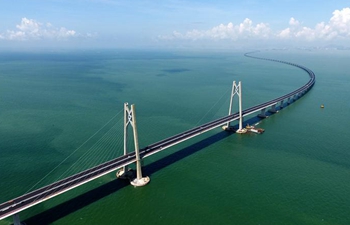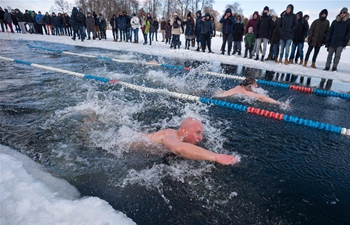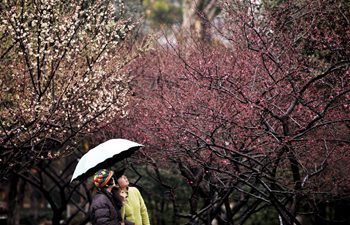
Photo taken on Feb. 27, 2018 shows the entrance of Svalbard Global Seed Vault on Norway's remote Arctic archipelago of Svalbard. The underground agricultural seed bank in Norway will receive a 13-million-U.S.-dollar grant for upgrade as it celebrates its 10th anniversary this year, the Norwegian government has said. The Svalbard Global Seed Vault, dubbed the "Doomsday" and the "Noah's Ark" vault, was established as a backup of crop seed samples stored in other seed banks around the world. It is considered to be a vital international facility to safeguard global food supply amid growing threats of both natural and man-made disasters. (Xinhua/Liang Youchang)
OSLO, Feb. 28 (Xinhua) -- An underground agricultural seed bank in Norway will receive a 13-million-U.S.-dollar grant for upgrade as it celebrates its 10th anniversary this year, the Norwegian government has said.
The Svalbard Global Seed Vault, dubbed the "Doomsday" and the "Noah's Ark" vault, was established as a backup of crop seed samples stored in other seed banks around the world. It is considered to be a vital international facility to safeguard global food supply amid growing threats of both natural and man-made disasters.
The renovation was announced by the vault on Monday, when it celebrated its 10th anniversary by adding more than 76,000 seed samples to its frozen storage chambers, bringing the total number of deposits above the 1-million mark to 1,059,646.
The latest additions were shipped from across the world. They include varieties of rice, wheat and maize, the black-eye pea -- a major source of protein in Africa and South Asia, and Bambara groundnut -- a drought-tolerant, peanut-like crop originating in West Africa.
The vault opens about twice or three times a year for deposits and its doors are kept shut during other times. The staff check inside the vault through cameras and remote sensors.
The Norwegian government said technical improvements are needed at the vault after a decade of operation. It will offer 100 million Norwegian krones (12.7 million dollars) in 2018 for the upgrades.
The work will include the construction of a concrete access tunnel, a building for emergency power and refrigerating units, as well as electrical equipment that will emit heat through the tunnel.
The entrance of the vault was flooded last year as a result of extreme weather, but fortunately, the water didn't reach the actual storage chambers located some 120 meters underground.
New waterproof walls have since been erected. Ongoing reinforcement work will protect the vault against warmer and wetter conditions caused by climate change.
One of the vault's recent contributions was giving seeds to Syria through the International Center for Agricultural Research in the Dry Areas to help re-grow the crops destroyed by the civil war there.
"It's not for Doomsday. It is truly a safety net," Lise Lykke Steffensen, director of the Nordic Genetic Resource Center, said while giving Xinhua journalists a guided tour of the vault.
Steffensen said the seeds in a gene bank in Aleppo, Syria, became inaccessible due to the war in 2015 and 2017. However, their backups in the vault helped grow the crops in Syria again.





